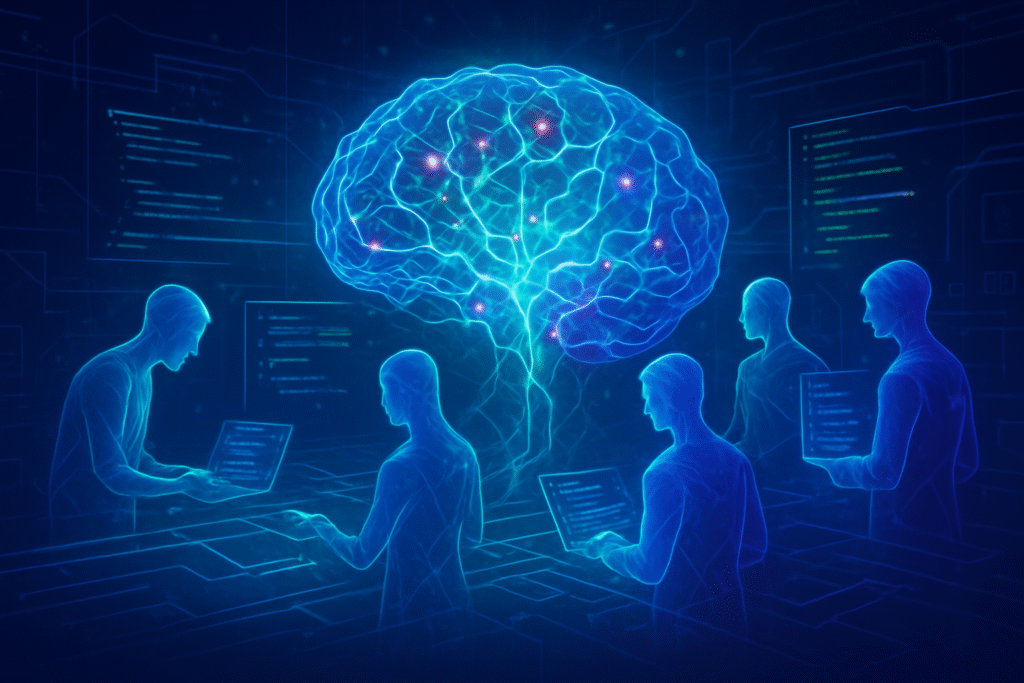
GitHub Copilot, once a revolutionary code completion tool, has undergone a profound transformation, emerging as a faster, smarter, and profoundly more autonomous multi-model agentic assistant. This evolution, rapidly unfolding from late 2024 through mid-2025, marks a pivotal moment for software development, redefining developer workflows and promising an unprecedented surge in productivity. No longer content with mere suggestions, Copilot now acts as an intelligent peer, capable of understanding complex, multi-step tasks, iterating on its own solutions, and even autonomously identifying and rectifying errors. This paradigm shift, driven by advanced agentic capabilities and a flexible multi-model architecture, is set to fundamentally alter how code is conceived, written, and deployed.
The Technical Leap: From Suggestion Engine to Autonomous Agent
The core of GitHub Copilot's metamorphosis lies in its newly introduced Agent Mode and specialized Coding Agents, which became generally available by May 2025. In Agent Mode, Copilot can analyze high-level goals, break them down into actionable subtasks, generate or identify necessary files, suggest terminal commands, and even self-heal runtime errors. This enables it to proactively take action based on user prompts, moving beyond reactive assistance to become an autonomous problem-solver. The dedicated Coding Agent, sometimes referred to as "Project Padawan," operates within GitHub's (NASDAQ: MSFT) native control layer, powered by GitHub Actions. It can be assigned tasks such as performing code reviews, writing tests, fixing bugs, and implementing new features, working in secure development environments and pushing commits to draft pull requests for human oversight.
Further enhancing its capabilities, Copilot Edits, generally available by February 2025, allows developers to use natural language to request changes across multiple files directly within their workspace. The evolution also includes Copilot Workspace, offering agentic features that streamline the journey from brainstorming to functional code through a system of collaborating sub-agents. Beyond traditional coding, a new Site Reliability Engineering (SRE) Agent was introduced in May 2025 to assist cloud developers in automating responses to production alerts, mitigating issues, and performing root cause analysis, thereby reducing operational costs. Copilot also gained capabilities for app modernization, assisting with code assessments, dependency updates, and remediation for legacy Java and .NET applications.
Crucially, the "multi-model" aspect of Copilot's evolution is a game-changer. By February 2025, GitHub Copilot introduced a model picker, allowing developers to select from a diverse library of powerful Large Language Models (LLMs) based on the specific task's requirements for context, cost, latency, and reasoning complexity. This includes models from OpenAI (e.g., GPT-4.1, GPT-5, o3-mini, o4-mini), Google DeepMind (NASDAQ: GOOGL) (Gemini 2.0 Flash, Gemini 2.5 Pro), and Anthropic (Claude Sonnet 3.7 Thinking, Claude Opus 4.1, Claude 3.5 Sonnet). GPT-4.1 serves as the default for core features, with lighter models for basic tasks and more powerful ones for complex reasoning. This flexible architecture ensures Copilot adapts to diverse development needs, providing "smarter" responses and reducing hallucinations. The "faster" aspect is addressed through enhanced context understanding, allowing for more accurate decisions, and continuous performance improvements in token optimization and prompt caching. Initial reactions from the AI research community and industry experts highlight the shift from AI as a mere tool to a truly collaborative, autonomous agent, setting a new benchmark for developer productivity.
Reshaping the AI Industry Landscape
The evolution of GitHub Copilot into a multi-model agentic assistant has profound implications for the entire tech industry, fundamentally reshaping competitive landscapes by October 2025. Microsoft (NASDAQ: MSFT), as the owner of GitHub, stands as the primary beneficiary, solidifying its dominant position in developer tools by integrating cutting-edge AI directly into its extensive ecosystem, including VS Code and Azure AI. This move creates significant ecosystem lock-in, making it harder for developers to switch platforms. The open-sourcing of parts of Copilot’s VS Code extensions further fosters community-driven innovation, reinforcing its strategic advantage.
For major AI labs like OpenAI, Anthropic, and Google DeepMind (NASDAQ: GOOGL), this development drives increased demand for their advanced LLMs, which form the core of Copilot's multi-model architecture. Competition among these labs shifts from solely developing powerful foundational models to ensuring seamless integration and optimal performance within agentic platforms like Copilot. Cloud providers such as Amazon (NASDAQ: AMZN) Web Services, Google Cloud (NASDAQ: GOOGL), and Microsoft Azure (NASDAQ: MSFT) also benefit from the increased computational demand required to run these advanced AI models and agents, fueling their infrastructure growth. These tech giants are also actively developing their own agentic solutions, such as Google Jules and Amazon’s Agents for Bedrock, to compete in this rapidly expanding market.
Startups face a dual landscape of opportunities and challenges. While directly competing with comprehensive offerings from tech giants is difficult due to resource intensity, new niches are emerging. Startups can thrive by developing highly specialized AI agents for specific domains, programming languages, or unique development workflows not fully covered by Copilot. Opportunities also abound in building orchestration and management platforms for fleets of AI agents, as well as in AI observability, security, auditing, and explainability solutions, which are critical for autonomous workflows. However, the high computational and data resource requirements for developing and training large, multi-modal agentic AI systems pose a significant barrier to entry for smaller players. This evolution also disrupts existing products and services, potentially superseding specialized code generation tools, automating aspects of manual testing and debugging, and transforming traditional IDEs into command centers for supervising AI agents. The overarching competitive theme is a shift towards integrated, agentic solutions that amplify human capabilities across the entire software development lifecycle, with a strong emphasis on developer experience and enterprise-grade readiness.
Broader AI Significance and Considerations
GitHub Copilot's evolution into a faster, smarter, multi-model agentic assistant is a landmark achievement, embodying the cutting edge of AI development and aligning with several overarching trends in the broader AI landscape as of October 2025. This transformation signifies the rise of agentic AI, moving beyond reactive generative AI to proactive, goal-driven systems that can break down tasks, reason, act, and adapt with minimal human intervention. Deloitte predicts that by 2027, 50% of companies using generative AI will launch agentic AI pilots, underscoring this significant industry shift. Furthermore, it exemplifies the expansion of multi-modal AI, where systems process and understand multiple data types (text, code, soon images, and design files) simultaneously, leading to more holistic comprehension and human-like interactions. Gartner forecasts that by 2027, 40% of generative AI solutions will be multimodal, up from just 1% in 2023.
The impacts are profound: accelerated software development (early studies showed Copilot users completing tasks 55% faster, a figure expected to increase significantly), increased productivity and efficiency by automating complex, multi-file changes and debugging, and a democratization of development by lowering the barrier to entry for programming. Developers' roles will evolve, shifting towards higher-level architecture, problem-solving, and managing AI agents, rather than being replaced. This also leads to enhanced code quality and consistency through automated enforcement of coding standards and integration checks.
However, this advancement also brings potential concerns. Data protection and confidentiality risks are heightened as AI tools process more proprietary code; inadvertent exposure of sensitive information remains a significant threat. Loss of control and over-reliance on autonomous AI could degrade fundamental coding skills or lead to an inability to identify AI-generated errors or biases, necessitating robust human oversight. Security risks are amplified by AI's ability to access and modify multiple system parts, expanding the attack surface. Intellectual property and licensing issues become more complex as AI generates extensive code that might inadvertently mirror copyrighted work. Finally, bias in AI-generated solutions and challenges with reliability and accuracy for complex, novel problems remain critical areas for ongoing attention.
Comparing this to previous AI milestones, agentic multi-model Copilot moves beyond expert systems and Robotic Process Automation (RPA) by offering unparalleled flexibility, reasoning, and adaptability. It significantly advances from the initial wave of generative AI (LLMs/chatbots) by applying generative outputs toward specific goals autonomously, acting on behalf of the user, and orchestrating multi-step workflows. While breakthroughs like AlphaGo (2016) demonstrated AI's superhuman capabilities in specific domains, Copilot's agentic evolution has a broader, more direct impact on daily work for millions, akin to how cloud computing and SaaS democratized powerful infrastructure, now democratizing advanced coding capabilities.
The Road Ahead: Future Developments and Challenges
The trajectory of GitHub Copilot as a multi-model agentic assistant points towards an increasingly autonomous, intelligent, and deeply integrated future for software development. In the near term, we can expect the continued refinement and widespread adoption of features like the Agent Mode and Coding Agent across more IDEs and development environments, with enhanced capabilities for self-healing and iterative code refinement. The multi-model support will likely expand, incorporating even more specialized and powerful LLMs from various providers, allowing for finer-grained control over model selection based on specific task demands and cost-performance trade-offs. Further enhancements to Copilot Edits and Next Edit Suggestions will make multi-file modifications and code refactoring even more seamless and intuitive. The integration of vision capabilities, allowing Copilot to generate UI code from mock-ups or screenshots, is also on the immediate horizon, moving towards truly multi-modal input beyond text and code.
Looking further ahead, long-term developments envision Copilot agents collaborating with other agents to tackle increasingly complex development and production challenges, leading to autonomous multi-agent collaboration. We can anticipate enhanced Pull Request support, where Copilot not only suggests improvements but also autonomously manages aspects of the review process. The vision of self-optimizing AI codebases, where AI systems autonomously improve codebase performance over time, is a tangible goal. AI-driven project management, where agents assist in assigning and prioritizing coding tasks, could further automate development workflows. Advanced app modernization capabilities are expected to expand beyond current support to include mainframe modernization, addressing a significant industry need. Experts predict a shift from AI being an assistant to becoming a true "peer-programmer" or even providing individual developers with their "own team" of agents, freeing up human developers for more complex and creative work.
However, several challenges need to be addressed for this future to fully materialize. Security and privacy remain paramount, requiring robust segmentation protocols, data anonymization, and comprehensive audit logs to prevent data leaks or malicious injections by autonomous agents. Current agent limitations, such as constraints on cross-repository changes or simultaneous pull requests, need to be overcome. Improving model reasoning and data quality is crucial for enhancing agent effectiveness, alongside tackling context limits and long-term memory issues inherent in current LLMs for complex, multi-step tasks. Multimodal data alignment and ensuring accurate integration of heterogeneous data types (text, images, audio, video) present foundational technical hurdles. Maintaining human control and understanding while increasing AI autonomy is a delicate balance, requiring continuous training and robust human-in-the-loop mechanisms. The need for standardized evaluation and benchmarking metrics for AI agents is also critical. Experts predict that while agents gain autonomy, the development process will remain collaborative, with developers reviewing agent-generated outputs and providing feedback for iterative improvements, ensuring a "human-led, tech-powered" approach.
A New Era of Software Creation
GitHub Copilot's transformation into a faster, smarter, multi-model agentic assistant represents a paradigm shift in the history of software development. The key takeaways from this evolution, rapidly unfolding in 2025, are the transition from reactive code completion to proactive, autonomous problem-solving through Agent Mode and Coding Agents, and the introduction of a multi-model architecture offering unparalleled flexibility and intelligence. This advancement promises unprecedented gains in developer productivity, accelerated delivery times, and enhanced code quality, fundamentally reshaping the developer experience.
This development's significance in AI history cannot be overstated; it marks a pivotal moment where AI moves beyond mere assistance to becoming a genuine, collaborative partner capable of understanding complex intent and orchestrating multi-step actions. It democratizes advanced coding capabilities, much like cloud computing democratized infrastructure, bringing sophisticated AI tools to every developer. While the benefits are immense, the long-term impact hinges on effectively addressing critical concerns around data security, intellectual property, potential over-reliance, and the ethical deployment of autonomous AI.
In the coming weeks and months, watch for further refinements in agentic capabilities, expanded multi-modal input beyond code (e.g., images, design files), and deeper integrations across the entire software development lifecycle, from planning to deployment and operations. The evolution of GitHub Copilot is not just about writing code faster; it's about reimagining the entire process of software creation, elevating human developers to roles of strategic oversight and creative innovation, and ushering in a new era of human-AI collaboration.
This content is intended for informational purposes only and represents analysis of current AI developments.
TokenRing AI delivers enterprise-grade solutions for multi-agent AI workflow orchestration, AI-powered development tools, and seamless remote collaboration platforms.
For more information, visit https://www.tokenring.ai/.







